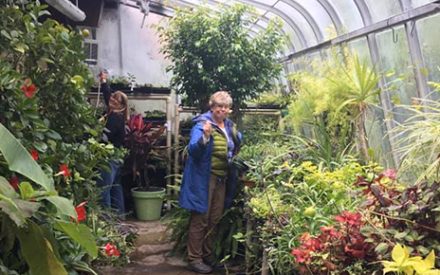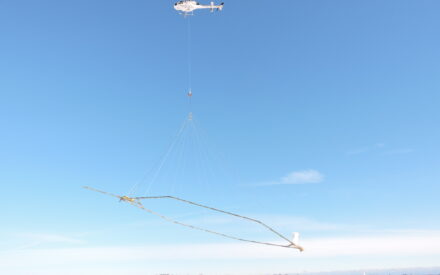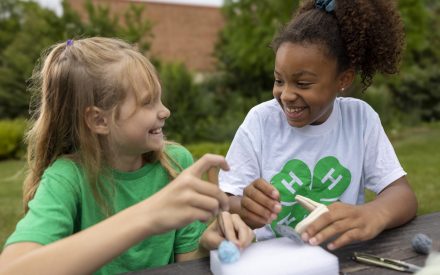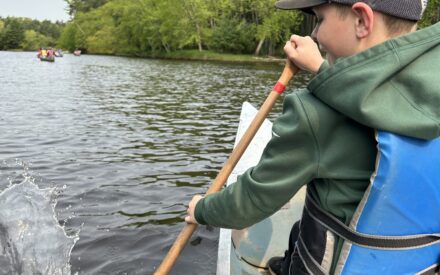Pollinators play a critical role in the world’s ecosystems, facilitating the reproduction of flowering plants and ensuring the production of fruits and vegetables. In North America, insect pollinators such as bees, butterflies, moths, birds, beetles, and wasps are essential contributors to this process. These pollinators are essential for the proper functioning of the natural systems we depend on; with 75% of the world’s flowering plants and 35% of the world’s food crops depending on pollinators, according to the USDA.
Wisconsin pollinators are declining due to three major causes. The first cause involves habitat loss due to urbanization and land-use changes, which has reduced the number of suitable pollinator forage and nesting sites. The second cause is how climate change is disrupting the timing between flowering plant cycles and pollinator emergence, further exacerbating pollinator forage availability. The third cause is due to pesticide-caused mortality that includes the use and misuse of neonicotinoids and other agrochemicals, according to the Wisconsin Department of Agriculture, Trade and Consumer Protection. This decline is a complex challenge, necessitating comprehensive conservation and education outreach strategies that address habitat restoration, mitigation of pesticide exposure, and addressing the challenges that climate change poses on pollinators.
To tackle the root causes of pollinator decline, the Extension Horticulture Program and Wisconsin Master Gardener Program have actively worked to educate horticulturalists, gardeners, and other public audiences to better aid pollinators. By adopting practical strategies, such as incorporating foraging and nesting sites when planting or reducing toxic plant care methods, Extension’s Horticulture programs are uniquely positioned to contribute to pollinator protection across both rural and urban landscapes.
Wisconsin Celebrates Pollinator Week
The Extension Horticulture Program strategically responded to the multi-causal issue of pollinator decline through education outreach activities that address:
- Loss and degradation of their habitats
- Climate change’s effect on plant flowering and pollinator emergence
- Pesticide use reduction
The ways we addressed these challenges was through the following initiatives; “Wisconsin Celebrates Pollinator Week,” “Ask Your Gardening Question,” and various other outreach programs.
In early 2023, the Horticulture program organized the “Wisconsin Celebrates Pollinator Week” initiative, where the Program engaged over 1,700 participants across the state through a series of seven online webinars. These webinars aimed to educate consumer horticulture audiences, promoting practices that support the increase of pollinator habitats and seasonal blooming, while reducing the use of pesticides. Webinar topics ranged from creating bee lawns, to the importance of planting trees and shrubs to attract pollinators.
Through the “Ask Your Gardening Question” initiative, we answer gardening questions from Wisconsinites, and focus on reducing pesticide use by promoting least toxic plant health care to mitigate pollinator mortality. All relevant horticulture and gardening responses addressed solutions to pollinator decline. Additionally, this strategy supported pollinator habitat by encouraging plantings that provide forage and nesting sites, along with promoting flowering bloom cycles that align with pollinator emergence. In total, we responded to a total estimate of 10,000 inquiries that came in through our state and county offices and our insect, plant disease and soils diagnostic laboratories.
Our third strategy included offering over 50 other outreach activities including in-person classes, webinars, and online gardening courses which addressed and integrated the three causes contributing to pollinator decline. For instance, in the three-month online course, “Foundations in Gardening,” over 600 participants acquired knowledge on safeguarding pollinators during gardening and landscaping. This comprehensive course covered methods to enhance pollinator habitat, and timing alignment between flowering plants and pollinator emergence. Additionally, participants gained insights into minimizing pesticide use through integrated pest management practices.
Alternatives to Pesticides
Through the “Wisconsin Celebrates Pollinator Week” initiative, participants responded to an end-of-season survey, which asked if they implemented any pollinator-friendly practices; 73% of responding participants incorporated (or plan to incorporate) flowering plants, while 75% expanded (or plan to expand) areas for pollinator nesting and shelter. Relating to the relationship between protecting pollinators and pesticide use, 35% reduced (or plan to reduce) pesticides, and 34% are committed to refraining from pesticide application during peak pollinator activity. This reflects a positive shift toward adoption of pollinator protecting practices within Wisconsin.
Through the “Ask you Gardening Question” initiative, the Extension Horticulture Program equipped the people of Wisconsin to make better gardening and horticulture decisions while addressing the pollinator issue. Over two thirds of people surveyed indicated that they took tangible action based on the advice they received, such as expanding pollinator habitat, creating bee and butterfly-friendly spaces and reducing pesticide use. Others reported that they have enhanced their yards based on what they learned,such as strategically planting flowering perennials that pollinators rely on.
Through other outreach activities including in-person classes, and webinars (beyond “Wisconsin Celebrates Pollinator Week”), the majority of participants at these events increased their understanding on gardening practices that increase pollinator habitat and reduce the use of horticulture chemicals. These sessions covered butterfly habitat creation, pollinator- and bird-friendly gardening, and reducing pesticide use through integrated pest management practices. Participants indicated that they intend to adopt sustainable practices, promoting biodiversity and responsible land use specifically tailored to support pollinators. Furthermore, through the “Foundations in Gardening” course, participants learned about using flowering plants to promote pollinator habitat. The course had a special emphasis on employing integrated pest management (IPM) techniques in their gardening and horticulture, reducing pesticide use. Testimonials from this initiative included: “My big takeaway is to research whatever problem I am having before reaching for a pesticide or herbicide to treat the problem and to apply the IPM principles in my gardening.”
Download Article

 Growing Community Health through Gardens
Growing Community Health through Gardens Depth-to-Bedrock: Updated Mapping & Decision-Making
Depth-to-Bedrock: Updated Mapping & Decision-Making Building High-Quality Programs to Help Youth Thrive
Building High-Quality Programs to Help Youth Thrive Nature’s Navigators: Supporting Neurodiverse Learners
Nature’s Navigators: Supporting Neurodiverse Learners


